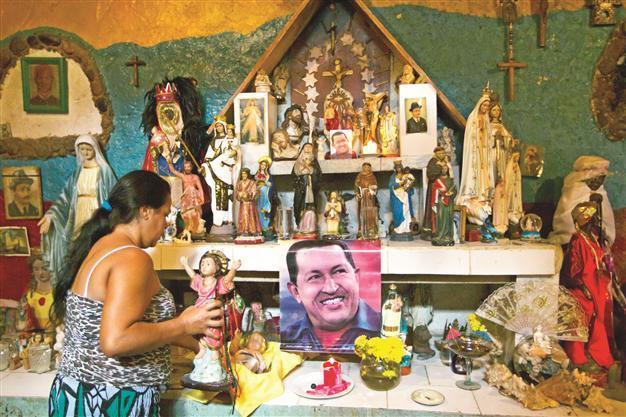Chavez suffering severe lung infection as uncertainty grows
CARACAS

Venezuelan woman places a figurine on an altar with images of Venezuela’s President Chavez in Caracas. Deepening crisis over Chavez’s health raised questions ahead of the presidential oath-taking. REUTERS photo
Venezuelan President Hugo Chavez is struggling with a severe lung infection ahead of his presidential oath on Jan. 10 as compatriots pray for the health of their cancer-stricken leader.Chavez is being treated for “respiratory deficiency” after complications from a severe lung infection, his government said, pointing to a deepening health crisis for the ailing, 58-year-old president.
“Chavez has faced complications as a result of a severe respiratory infection. This infection has led to respiratory deficiency that requires Commander to remain in strict compliance with his medical treatment,” Information Minister Ernesto Villegas said Jan. 3.
The government’s characterization raised the possibility that Chavez might be breathing with the assistance of a machine. But the government did not address that question and did not give details of the president’s treatment. The government expressed confidence in Chavez’s medical team and accused the opposition and the media of using the Venezuelan president’s poor health of waging a “psychological war” to destabilize the country.
Dissidence over oath
Officials have urged Venezuelans not to heed rumors about Chavez’s condition. The government “warns the Venezuelan people about the psychological war that the transnational media complex has unleashed around the health of the chief of state, with the ultimate goal of destabilizing the Bolivarian Republic of Venezuela,” Villegas said.
The statement came amid rising demands at home for a detailed accounting of Chavez’s condition and whether he is fit to take the oath of office Jan. 10 for another six-year term. Chavez’s health crisis has raised questions ahead of the oath-taking, including whether the inauguration could legally be postponed and what will happen if Chavez cannot begin his new term. The plans of Chavez’s allies remain a mystery.
The Venezuelan Constitution says the presidential oath should be taken Jan. 10 before the National Assembly, and officials have raised the possibility that Chavez might not be well enough to do that, without saying what will happen if he is unable to fulfill his duty. The Constitution says that if a president or president-elect dies or is declared unable to continue in office, presidential powers should be held temporarily by the president of the National Assembly, who is now Diosdado Cabello. It says a new presidential vote should be held within 30 days.
Opposition leaders have argued that Chavez, who was re-elected in October, no longer seems fit to continue as president and have demanded that a new election be held if he is not in Caracas on inauguration day. But Chavez’s confidants dismiss the view that the inauguration date is a hard deadline, saying Chavez could be given more time to recover from his surgery if necessary. Chavez has not spoken publicly or been seen since his Dec. 11, 2012, operation in Cuba. He has undergone four cancer-related surgeries since June 2011 for an undisclosed type of pelvic cancer. He has also undergone chemotherapy and radiation treatment.
Compiled from AFP and AP stories by the Daily News staff.
















